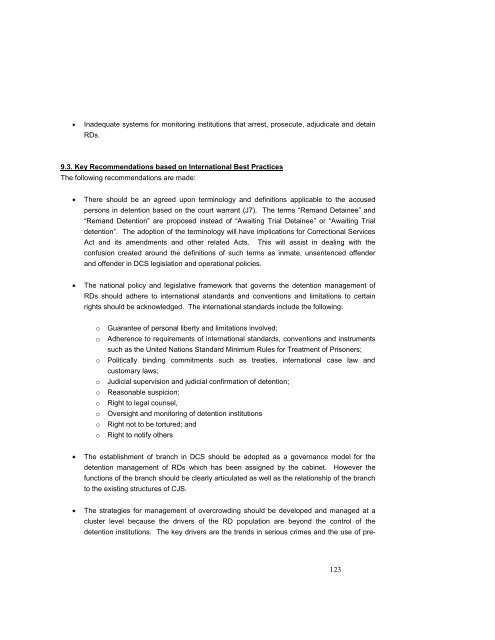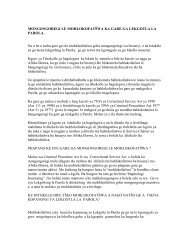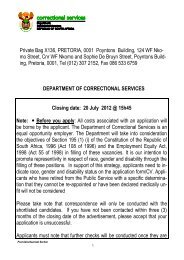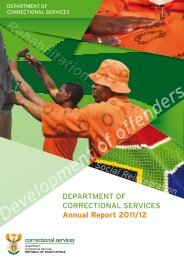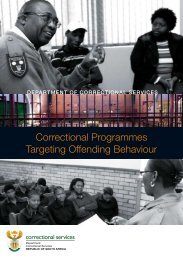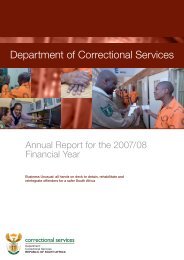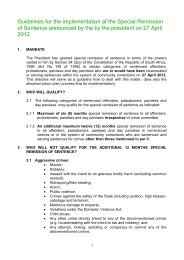Management of Remand Detainees in South Africa - DCS-Home
Management of Remand Detainees in South Africa - DCS-Home
Management of Remand Detainees in South Africa - DCS-Home
Create successful ePaper yourself
Turn your PDF publications into a flip-book with our unique Google optimized e-Paper software.
Inadequate systems for monitor<strong>in</strong>g <strong>in</strong>stitutions that arrest, prosecute, adjudicate and deta<strong>in</strong><br />
RDs.<br />
9.3. Key Recommendations based on International Best Practices<br />
The follow<strong>in</strong>g recommendations are made:<br />
There should be an agreed upon term<strong>in</strong>ology and def<strong>in</strong>itions applicable to the accused<br />
persons <strong>in</strong> detention based on the court warrant (J7). The terms “<strong>Remand</strong> Deta<strong>in</strong>ee” and<br />
“<strong>Remand</strong> Detention” are proposed <strong>in</strong>stead <strong>of</strong> “Await<strong>in</strong>g Trial Deta<strong>in</strong>ee” or “Await<strong>in</strong>g Trial<br />
detention”. The adoption <strong>of</strong> the term<strong>in</strong>ology will have implications for Correctional Services<br />
Act and its amendments and other related Acts. This will assist <strong>in</strong> deal<strong>in</strong>g with the<br />
confusion created around the def<strong>in</strong>itions <strong>of</strong> such terms as <strong>in</strong>mate, unsentenced <strong>of</strong>fender<br />
and <strong>of</strong>fender <strong>in</strong> <strong>DCS</strong> legislation and operational policies.<br />
The national policy and legislative framework that governs the detention management <strong>of</strong><br />
RDs should adhere to <strong>in</strong>ternational standards and conventions and limitations to certa<strong>in</strong><br />
rights should be acknowledged. The <strong>in</strong>ternational standards <strong>in</strong>clude the follow<strong>in</strong>g:<br />
o Guarantee <strong>of</strong> personal liberty and limitations <strong>in</strong>volved;<br />
o Adherence to requirements <strong>of</strong> <strong>in</strong>ternational standards, conventions and <strong>in</strong>struments<br />
such as the United Nations Standard M<strong>in</strong>imum Rules for Treatment <strong>of</strong> Prisoners;<br />
o Politically b<strong>in</strong>d<strong>in</strong>g commitments such as treaties, <strong>in</strong>ternational case law and<br />
customary laws;<br />
o Judicial supervision and judicial confirmation <strong>of</strong> detention;<br />
o Reasonable suspicion;<br />
o Right to legal counsel,<br />
o Oversight and monitor<strong>in</strong>g <strong>of</strong> detention <strong>in</strong>stitutions<br />
o Right not to be tortured; and<br />
o Right to notify others<br />
The establishment <strong>of</strong> branch <strong>in</strong> <strong>DCS</strong> should be adopted as a governance model for the<br />
detention management <strong>of</strong> RDs which has been assigned by the cab<strong>in</strong>et. However the<br />
functions <strong>of</strong> the branch should be clearly articulated as well as the relationship <strong>of</strong> the branch<br />
to the exist<strong>in</strong>g structures <strong>of</strong> CJS.<br />
The strategies for management <strong>of</strong> overcrowd<strong>in</strong>g should be developed and managed at a<br />
cluster level because the drivers <strong>of</strong> the RD population are beyond the control <strong>of</strong> the<br />
detention <strong>in</strong>stitutions. The key drivers are the trends <strong>in</strong> serious crimes and the use <strong>of</strong> pre-<br />
123


